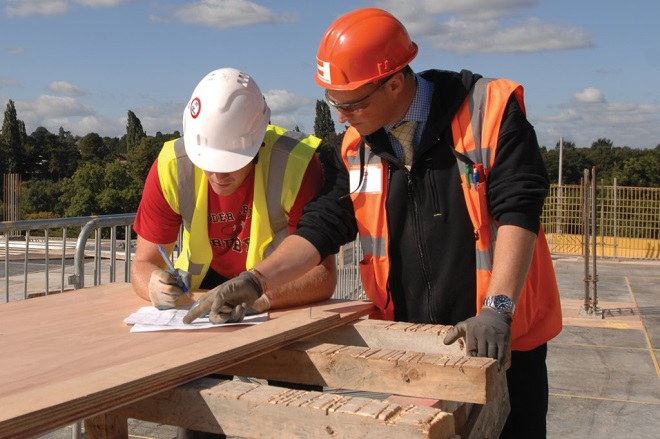The government has announced plans to invest £140m to create 5,000 more construction apprenticeships in England.
A joint statement from four Whitehall departments said “up to” 32 new Homebuilding Skills Hubs will be set up in areas that need more housing to train people in trades such as bricklayers, roofers, plasterers, scaffolders, electricians and carpenters.
The Construction Industry Training Board (CITB) and the National House-Building Council (NHBC) will work with the civil service and new quango Skills England to launch them.
Fast-track apprenticeships offered by the hubs will be able to be completed in 12-18 months, around half the time of a traditional 24-30-month construction apprenticeship, the statement said.
Skills minister Baroness Jacqui Smith said: “This government is committed to 1.5 million homes being built across this parliament, while breaking down barriers to opportunity by fixing our broken skills system.
“If we are to meet this ambitious target and fix the foundations of our economy, we need to ensure we have a skilled workforce, and give more apprentices a foot on the career ladder.
“The need to boost our country’s skills is crucial to our mission-driven government, and I am pleased that this initiative will give apprentices skills to seize opportunity.”
Twelve of the hubs will form part of a national network of NHBC-led multi-skills training centres.
NHBC director of business change Roger Morton said: “Our expert facilities will shake up the industry starting with training in critical areas including bricklaying, groundwork and site carpentry.
“Our intensive training will produce skilled tradespeople faster, equipping them to hit the ground running from day one.
“With funding support through the apprenticeship levy and generous grants, I’d say to builders and contractors, there’s never been a better time to invest in apprentices. It’s an opportunity to grow your workforce while offering talented people a rewarding and well-paid career in this essential industry.”
CITB chief executive Tim Balcon added: “This investment to launch 32 Homebuilding Skills Hubs will help meet the homebuilding targets while flattening peaks in demand for construction skills on homebuilding across the country.”
All of the hubs are due to launch by 2028.
Chartered Institute of Building acting head of policy and public affairs David Barnes welcomed the announcement but said there were other issues in training that should be addressed.
“While we understand addressing the skills deficit is a time-sensitive issue, the gap is about capability as much as capacity. There is a lack of teachers with current practice knowledge, which only investment in training and better remuneration will solve.
“We hope the government will work closely with the construction industry to develop its course content, ensuring the right training is given – particularly in the shorter time frame. This will also be vital in ensuring we have the quality of homes consumers deserve,” he said.
Barnes called on ministers to also consider the high dropout rates among construction apprentices, which he believes could be made worse under the shorter, more intense programmes proposed.
He added: “Ultimately, while welcomed, this is by no means a complete solution to the housing plans, and there is still a long way to go to address the predicted shortfall of more than 250,000 workers needed to deliver construction output by 2028.”
Meanwhile, a group of organisations has called for asbestos awareness training to be made mandatory for all trades apprentices and college students.
Sunday (24 November) marks the 25th anniversary of all types of asbestos being banned in the UK, but 5,000 people still die every year due to its effects.
Charity Mesothelioma UK, campaign group Airtight on Asbestos and private companies High Speed Training and Independent Asbestos Training Providers have signed an open letter to the Department for Education on the issue.
High Speed Training head of learning and development Richard Anderson said: “A quarter of a century after all forms of asbestos were banned in the UK, and 100 years since the first recorded death, asbestos remains a deadly problem that shows no signs of being solved.
“As older buildings built using asbestos deteriorate and are demolished, exposure to asbestos will only continue to become more of a problem for tradespeople, their families, and the general public. It is vital that future generations are properly equipped with the knowledge to protect themselves and others from the dangers of this deadly material.”
Earlier this year, Construction News spoke to current and former construction workers affected by asbestos-related disease and examined whether enough is being done about its risks today.

